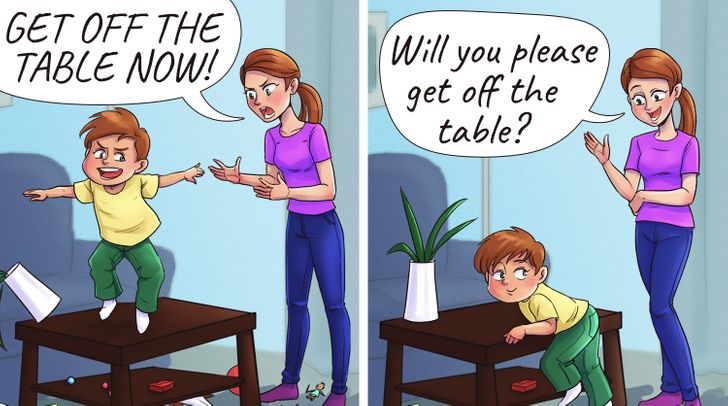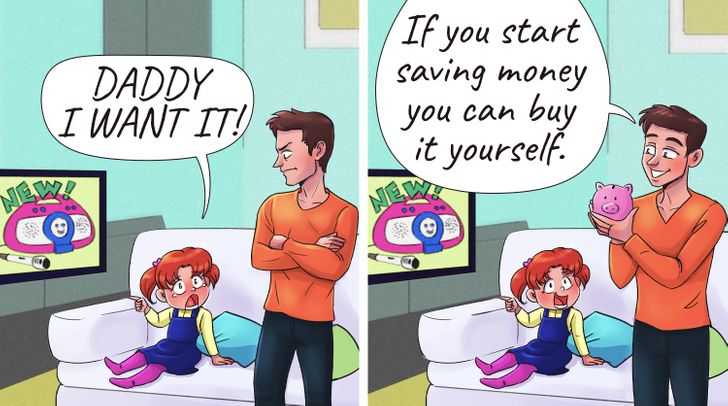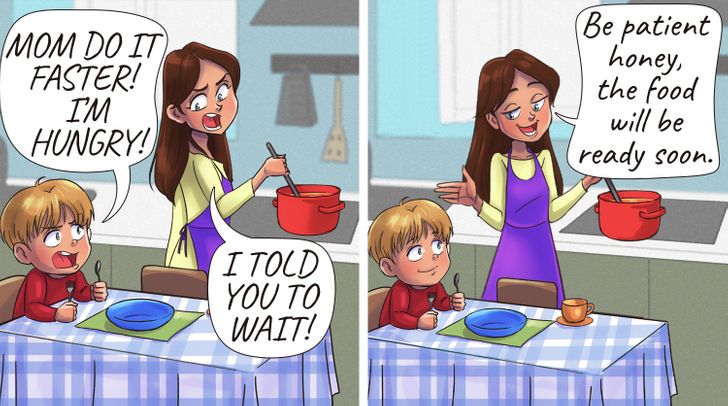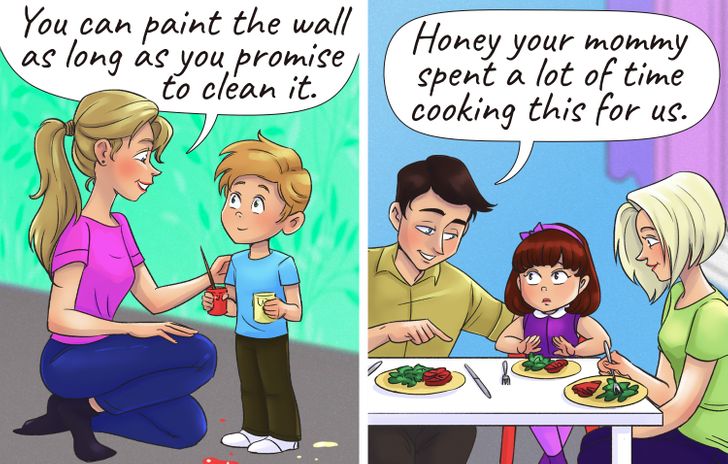like if u think its awesome :)
6 Ways the Word “No” Builds Strong Personalities
Many parents find themselves in a position where they can’t say “no” to their kids. This is because we live in a society of excess and parents are busier than ever with everything that’s going on in their lives. Also, many parents want to be best friends with their kids and best friends rarely say “no.” But, as a parent, refusing your kid’s wants can be crucial in building their strong personalities.
Bright Side would like to showcase how setting boundaries can benefit your child and give you a few alternatives to the word “no.”
1. They get a sense of structure and discipline.

Saying “no” to kids is the number one way to set limits for them. They learn that they have to stay within these limits and if they break them, there will be consequences. Therefore they get to feel responsible for their actions. However, before saying “no” to your child, you might need to find a good reason, because kids won’t accept a refusal without a fight.
Your children will also become more structured and disciplined when they don’t get their way all the time. They realize that they can’t have everything they want, whenever they want it. This is crucial because when they get older they will come to the realization that the world won’t just hand them anything they want. They need to follow the rules and play within the limits if they want to succeed.
2. It’ll help build their self-esteem.

Despite what many people think, having well-developed self-esteem doesn’t mean that you always need to feel good about yourself. Dr. Walsh says that we won’t help our kids build their self-esteem if we keep telling them how good they are. We need to encourage them to do things on their own, which means that we’ll need to say “no” to them sometimes.
At the beginning they will feel disappointed and sad, but then they will try to find a different solution to their problem. Their determination will guide them to their goal through a different path. This is how they will realize that any problem can be solved if you put your mind to it.
3. They will be able to distinguish between their wants and their needs.

Children get excited so easily with new toys they see in advertisements. And naturally, they will ask their parents to buy the newest toy for them because most of their friends already have it. As a parent, you need to explain to them that they don’t actually need that specific toy and that they already have other amazing stuff they can play with.
You can explain to them that toys will not make them happy. And if they do make them happy, that feeling will only last for a few days until an even newer toy makes its appearance. This behavior from your part will show them that needing and wanting something are not the same thing.
4. They will grow to be more patient.

According to experts, delaying gratification is an essential step to success. We all get to learn that when we get into adulthood, we have to work hard in order to achieve our goals. This same lesson should be taught to kids from a young age. Saying “yes” all the time will only make a child impatient when they can’t have what they want whenever they want it.
They will also grow up having unrealistic expectations, expecting everyone to bend to their will. So, when your kid asks you for dessert in the middle of the day, you can reply that they need to wait until after dinner. The child will be disappointed in that moment, but will feel highly satisfied when the time finally comes to enjoy their dessert.
5. Parents shouldn’t give in after their kids start crying or begging.

Most kids, when they get a refusal, start complaining and even resort to crying or screaming. And sometimes parents can’t handle the psychological stress and pressure, so they give in. However, giving in becomes a pattern over time and your kid knows that no matter whether you say “no” at first, you will change your mind if they start complaining. This shows a lack of discipline in both the parents and the kids.
However, if your child looks and sounds unusually angry and disappointed, you should have a discussion with them. If what they are asking for is reasonable, you can think about changing your mind. Yes, you should teach your kids discipline, but you should also be able to listen to their needs.
6. There are more effective ways to say no, than actually saying “no.”

Firmly using the word “no” with no other explanation can make your kid resentful of you. You have to find alternative phrases to explain to your child why they can’t have what they want, when they want it. For example, if they keep pestering you for candy bars, instead of saying “no,” you can offer them a different dessert that is healthier for them. By explaining that candy bars will ruin their teeth, they will know not to ask for them all the time.
Also, Dr. Walsh explains that it’s important to not use an angry tone when correcting a child. Kids will follow a polite correction more easily, rather than an angry command. Parents should also not forget to congratulate or thank their kids when they do follow a correction. Positive reinforcement is just as important in building their discipline and self-esteem.
Do you have trouble saying “no” to your child? How do they react when you tell them “no” and how do you justify your decision to them?
Comments
ok
Related Reads
11 Tricks to Teach Your Kids Responsibility From a Young Age

18 Moments That Capture the Reality of Any Relationship

Nine photos that show brilliantly how life changes after marriage

After My Surgery, My Sister-in-Law Shut Me Out of the Family

My Husband Forgot About the Baby Monitor Turned On, and I Accidentally Revealed What He Was Up To

I Discovered My Wife’s Secret Google Photo Gallery and Feel Utterly Disgusted

15 Short Stories About Relationships With the Endings That You Don’t Expect

My Mom Is Dying and My Pregnant Wife Posed Me a Very Hard Question

I Confronted My Wife Over a Hidden Pregnancy—She Shocked Me With the Truth

My Husband’s Tantrums Are Leading Him to Taste His Own Medicine

12 People Who Will Teach You to Never Mess With Them

10+ Hair Salon Horror Stories That Left Clients Shocked and Speechless
